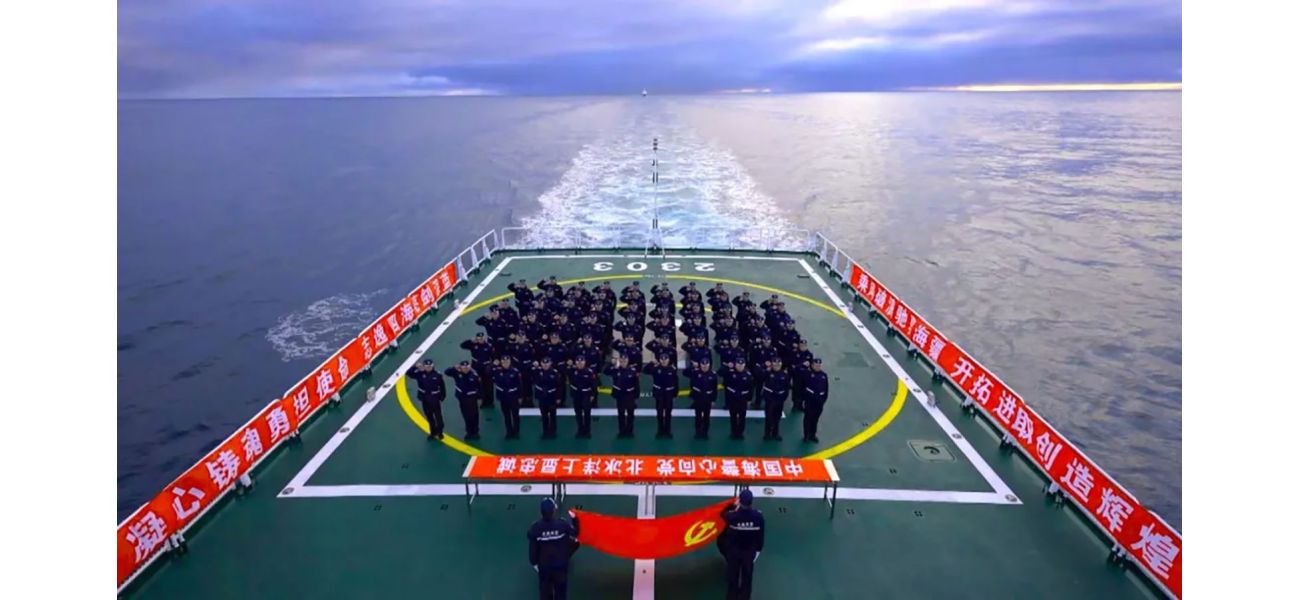China now says they have ventured into the Arctic Ocean for the very first time.
Ships from a rising superpower's coast guard were seen in a crucial sea between US and Russia.
October 3rd 2024.

China's Coast Guard claimed it entered waters of the Arctic Ocean for the first time as part of a joint patrol with Russia – in the latest sign of enhanced coordination between the two in a region where Beijing has long wished to expand its footprint.
The statement came a day after the US Coast Guard said it spotted four vessels from the Russian Border Guard and Chinese Coast Guard in the Bering Sea – the "northernmost" location it said it had ever observed the Chinese ships.
The joint patrol "effectively expanded the scope of the coast guard's ocean-going navigation" and tested their ability "to carry out missions in unfamiliar waters," the China Coast Guard said in a post on its official social media account on Wednesday.
READ MORE: 'Sitting and waiting to die': Australian teacher stranded in Lebanon
The CCG did not release the exact location of the patrol. A banner visible on one of the vessels in accompanying photos read "China Coast Guard devoting its heart to the Party; demonstrating loyalty in the Arctic Ocean," referring to China's ruling Communist Party.
The Russian government has not officially acknowledged the patrol, which Chinese state broadcaster CCTV said took place "a few days ago." Russian state media TASS published a report on the patrol, citing the CCG statement.
The US Coast Guard on Monday said it spotted the four vessels from the Russian Border Guard and Chinese Coast Guard "transiting in formation in a north-east direction" in the Bering Sea, some about 8km inside Russia's Exclusive Economic Zone on Saturday.
The Bering Sea stretches between Russia and Alaska and is part of the North Pacific Ocean. It connects to the Arctic Ocean through the Bering Strait, a narrow passage separating Asia and North America.
"This recent activity demonstrates the increased interest in the Arctic by our strategic competitors," Rear-Admiral Megan Dean, commander of the 17th Coast Guard District, said in the USCG statement.
READ MORE: Dad slugged with $25k defamation bill over Facebook post he didn't write
The US has raised concerns about China's growing role and coordination with Russia in the strategically and environmentally sensitive Arctic region, as the two countries tighten their security and economic ties more broadly.
US and Canadian forces in July intercepted Russian and Chinese bombers flying together near Alaska for the first time, while their two navies operated together in international waters off the Alaskan coast in 2022 and 2023, according to the US military.
Last year, CCG and Russia's Federal Security Service, which operates its coast guard, agreed to strengthen their "maritime law enforcement cooperation" and China was invited to observe Russia's "Arctic Patrol-2023" security drills.
Analysts say the new patrol is part of a broader pattern of collaboration – and designed to send a message to Washington, whose maritime activities in the South and East China Seas have longed irked Beijing.
"The significance of the Coast Guard operating farther north than it has ever done implies is extending its Coast Guard into areas the US has traditionally considered its own domain," said Carl Schuster, a retired US Navy captain and former director of operations at the US Pacific Command's Joint Intelligence Centre.
"China in particular is signalling that the US Coast Guard is not the only one that operate within and near other countries' Economic Exclusion Zones from their own home waters," he said.
READ MORE: Heat bears down on millions for long weekend
Arctic ambitions
Beijing has for years sought to increase its footprint in the Arctic, declaring itself a "near Arctic state" and beefing up its icebreaker and research capabilities in the region, where it's also heavily invested in Russian energy projects.China's Coast Guard recently announced that it had made its first ever entry into the Arctic Ocean, in a joint patrol with Russia. This is another example of the growing coordination between the two nations, particularly in a region where China has long wanted to expand its presence.
The news comes after the US Coast Guard reported seeing four vessels from the Russian Border Guard and Chinese Coast Guard in the Bering Sea – the furthest north they had ever observed Chinese ships. In a statement, the China Coast Guard explained that the joint patrol was a way to expand their ocean-going navigation capabilities and test their ability to operate in unfamiliar waters. However, they did not disclose the exact location of the patrol.
The Chinese state broadcaster CCTV reported that the patrol took place a few days ago, but the Russian government has not officially acknowledged it. However, Russian state media TASS did publish a report on the patrol, citing the statement from the China Coast Guard.
The Bering Sea, which lies between Russia and Alaska, is part of the North Pacific Ocean and connects to the Arctic Ocean through the Bering Strait. This area is of strategic and environmental importance, and the US has expressed concerns about China's growing role and coordination with Russia in the region. In fact, in July, US and Canadian forces intercepted Russian and Chinese bombers flying together near Alaska for the first time, and their navies have also operated together in international waters off the Alaskan coast.
Last year, the Chinese Coast Guard and Russia's Federal Security Service, which operates its own coast guard, agreed to strengthen their maritime law enforcement cooperation. China was also invited to observe Russia's "Arctic Patrol-2023" security drills. Analysts see this new joint patrol as part of a larger pattern of collaboration between the two nations, and also as a message to the US that China is expanding its presence in areas traditionally considered to be under US control.
Retired US Navy captain and former director of operations at the US Pacific Command's Joint Intelligence Centre, Carl Schuster, believes that this move by the Chinese Coast Guard signals their intention to operate in areas that the US has long considered its own. He also points out that China is letting the US know that they are not the only ones who can operate in and near other countries' Exclusive Economic Zones.
China has been making efforts to increase its presence in the Arctic for some time, claiming to be a "near Arctic state" and investing in icebreakers and research capabilities. They are also heavily involved in Russian energy projects in the region. This joint patrol with Russia is just the latest example of their Arctic ambitions.
The statement came a day after the US Coast Guard said it spotted four vessels from the Russian Border Guard and Chinese Coast Guard in the Bering Sea – the "northernmost" location it said it had ever observed the Chinese ships.
The joint patrol "effectively expanded the scope of the coast guard's ocean-going navigation" and tested their ability "to carry out missions in unfamiliar waters," the China Coast Guard said in a post on its official social media account on Wednesday.
READ MORE: 'Sitting and waiting to die': Australian teacher stranded in Lebanon
The CCG did not release the exact location of the patrol. A banner visible on one of the vessels in accompanying photos read "China Coast Guard devoting its heart to the Party; demonstrating loyalty in the Arctic Ocean," referring to China's ruling Communist Party.
The Russian government has not officially acknowledged the patrol, which Chinese state broadcaster CCTV said took place "a few days ago." Russian state media TASS published a report on the patrol, citing the CCG statement.
The US Coast Guard on Monday said it spotted the four vessels from the Russian Border Guard and Chinese Coast Guard "transiting in formation in a north-east direction" in the Bering Sea, some about 8km inside Russia's Exclusive Economic Zone on Saturday.
The Bering Sea stretches between Russia and Alaska and is part of the North Pacific Ocean. It connects to the Arctic Ocean through the Bering Strait, a narrow passage separating Asia and North America.
"This recent activity demonstrates the increased interest in the Arctic by our strategic competitors," Rear-Admiral Megan Dean, commander of the 17th Coast Guard District, said in the USCG statement.
READ MORE: Dad slugged with $25k defamation bill over Facebook post he didn't write
The US has raised concerns about China's growing role and coordination with Russia in the strategically and environmentally sensitive Arctic region, as the two countries tighten their security and economic ties more broadly.
US and Canadian forces in July intercepted Russian and Chinese bombers flying together near Alaska for the first time, while their two navies operated together in international waters off the Alaskan coast in 2022 and 2023, according to the US military.
Last year, CCG and Russia's Federal Security Service, which operates its coast guard, agreed to strengthen their "maritime law enforcement cooperation" and China was invited to observe Russia's "Arctic Patrol-2023" security drills.
Analysts say the new patrol is part of a broader pattern of collaboration – and designed to send a message to Washington, whose maritime activities in the South and East China Seas have longed irked Beijing.
"The significance of the Coast Guard operating farther north than it has ever done implies is extending its Coast Guard into areas the US has traditionally considered its own domain," said Carl Schuster, a retired US Navy captain and former director of operations at the US Pacific Command's Joint Intelligence Centre.
"China in particular is signalling that the US Coast Guard is not the only one that operate within and near other countries' Economic Exclusion Zones from their own home waters," he said.
READ MORE: Heat bears down on millions for long weekend
Arctic ambitions
Beijing has for years sought to increase its footprint in the Arctic, declaring itself a "near Arctic state" and beefing up its icebreaker and research capabilities in the region, where it's also heavily invested in Russian energy projects.China's Coast Guard recently announced that it had made its first ever entry into the Arctic Ocean, in a joint patrol with Russia. This is another example of the growing coordination between the two nations, particularly in a region where China has long wanted to expand its presence.
The news comes after the US Coast Guard reported seeing four vessels from the Russian Border Guard and Chinese Coast Guard in the Bering Sea – the furthest north they had ever observed Chinese ships. In a statement, the China Coast Guard explained that the joint patrol was a way to expand their ocean-going navigation capabilities and test their ability to operate in unfamiliar waters. However, they did not disclose the exact location of the patrol.
The Chinese state broadcaster CCTV reported that the patrol took place a few days ago, but the Russian government has not officially acknowledged it. However, Russian state media TASS did publish a report on the patrol, citing the statement from the China Coast Guard.
The Bering Sea, which lies between Russia and Alaska, is part of the North Pacific Ocean and connects to the Arctic Ocean through the Bering Strait. This area is of strategic and environmental importance, and the US has expressed concerns about China's growing role and coordination with Russia in the region. In fact, in July, US and Canadian forces intercepted Russian and Chinese bombers flying together near Alaska for the first time, and their navies have also operated together in international waters off the Alaskan coast.
Last year, the Chinese Coast Guard and Russia's Federal Security Service, which operates its own coast guard, agreed to strengthen their maritime law enforcement cooperation. China was also invited to observe Russia's "Arctic Patrol-2023" security drills. Analysts see this new joint patrol as part of a larger pattern of collaboration between the two nations, and also as a message to the US that China is expanding its presence in areas traditionally considered to be under US control.
Retired US Navy captain and former director of operations at the US Pacific Command's Joint Intelligence Centre, Carl Schuster, believes that this move by the Chinese Coast Guard signals their intention to operate in areas that the US has long considered its own. He also points out that China is letting the US know that they are not the only ones who can operate in and near other countries' Exclusive Economic Zones.
China has been making efforts to increase its presence in the Arctic for some time, claiming to be a "near Arctic state" and investing in icebreakers and research capabilities. They are also heavily involved in Russian energy projects in the region. This joint patrol with Russia is just the latest example of their Arctic ambitions.
[This article has been trending online recently and has been generated with AI. Your feed is customized.]
[Generative AI is experimental.]
0
0
Submit Comment





